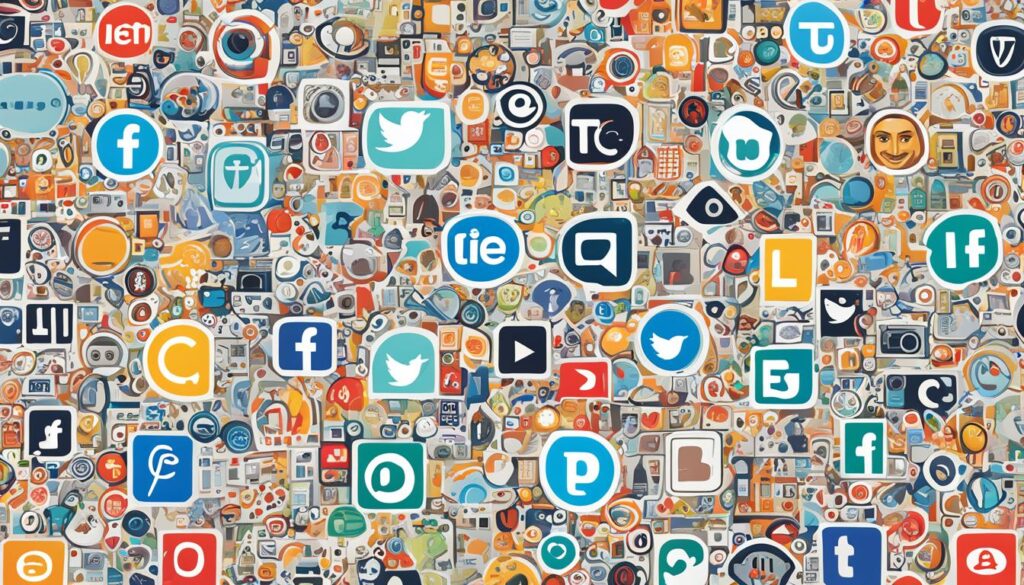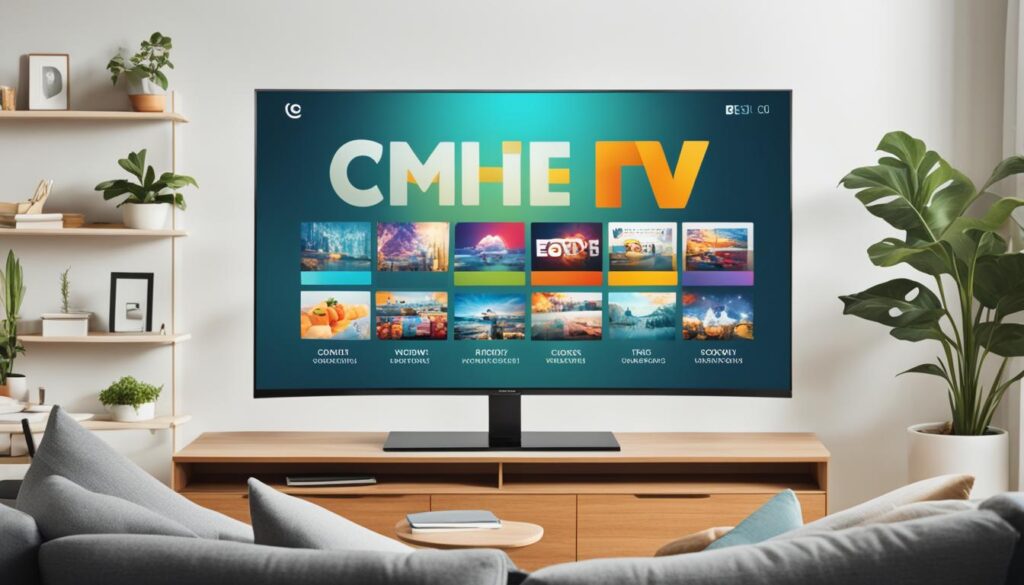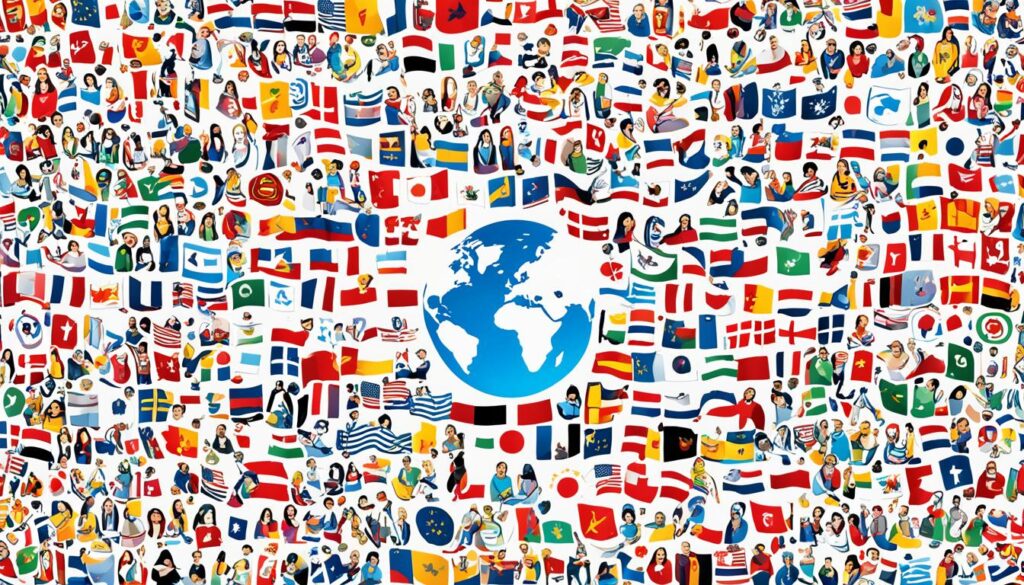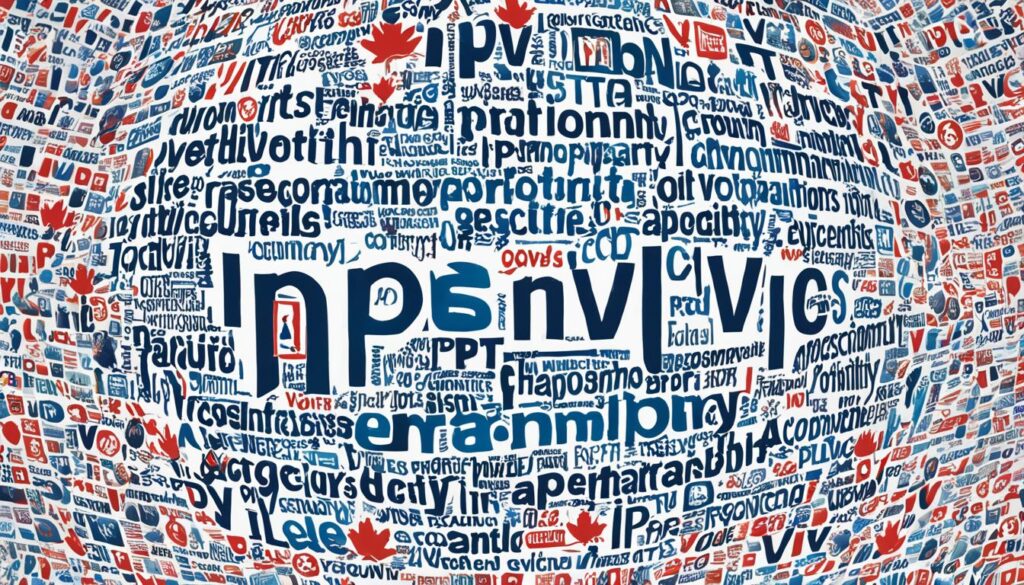Did you know that Internet Protocol Television (IPTV) has revolutionized the way religious and political discourse is disseminated and consumed? IPTV has transformed democracy and civic engagement on a massive scale, democratizing access to diverse perspectives, reshaping power dynamics, and promoting community-driven political discourse. In this article, we will explore how IPTV has changed the way we consume and interact with religious and political content, and the impact it has had on democracy.
Key Takeaways:
- IPTV has democratized access to diverse religious and political content.
- Viewers can personalize their viewing experiences and explore alternative perspectives.
- IPTV has challenged traditional media power dynamics, giving voice to independent content creators and grassroots movements.
- Through IPTV, global dialogue and cultural exchange on religious and political issues has been facilitated.
- IPTV has had a transformative impact on democracy and civic engagement, promoting a more inclusive and participatory democracy.
The Democratization of Content
IPTV services have completely transformed the landscape of religious and political content, allowing viewers to access a wide range of programs that cater to various beliefs and ideologies. Unlike traditional television channels, IPTV services break through geographical boundaries, offering a global selection of content that represents diverse perspectives.
With IPTV services, viewers are no longer limited to a handful of channels that may not adequately reflect their own beliefs or provide a holistic understanding of different viewpoints. The democratization of content through IPTV allows individuals to explore alternative sources of information, engage with diverse perspectives, and make more informed decisions about their own beliefs and ideologies.
Whether you are interested in religious sermons, political debates, or documentaries exploring social issues, IPTV services provide an extensive range of options that appeal to a wide range of interests. From religious programs that showcase different faith traditions to political talk shows that offer nuanced discussions on current affairs, IPTV brings a wealth of content that was once inaccessible to many.
Access to Diverse Perspectives
One of the key benefits of IPTV services is their ability to provide viewers with access to a multitude of perspectives on religious and political matters. By offering channels dedicated to specific religious traditions, IPTV ensures that viewers can learn about and engage with a wide range of faiths and practices.
Similarly, IPTV services feature programs and channels that cover political events and discussions from various angles, allowing viewers to understand different viewpoints on complex issues. This exposure to diverse perspectives fosters critical thinking, empathy, and a greater appreciation for the complexity of religious and political topics.
Moreover, IPTV services empower viewers to actively seek out programming that aligns with their own interests and values. The democratization of content enables individuals to curate their own viewing experiences, selecting programs that contribute to their personal growth and understanding.

By offering religious and political content from around the world, IPTV services create a global platform for dialogue, enriching our understanding of different cultures, traditions, and political systems. The ability to engage with diverse perspectives through IPTV contributes to a more inclusive and interconnected society.
In conclusion, IPTV services have democratized access to diverse religious and political content, allowing viewers to explore different perspectives, engage with alternative viewpoints, and make informed decisions about their own beliefs and ideologies. With the democratization of content, IPTV has truly transformed the way we consume and interact with religious and political programming.
Personalized Viewing Experiences
IPTV services prioritize user choice, customization, and personalization, providing viewers with the ability to curate their own unique viewing experiences. This level of personalization enhances the overall viewing experience and fosters greater engagement with religious and political discourse.
With IPTV, viewers have the freedom to choose content that aligns with their personal beliefs, values, and interests. Whether they are seeking in-depth political analysis or spiritual guidance, IPTV offers a diverse range of channels and programs to cater to their specific needs. By allowing users to handpick their content, IPTV ensures that viewers have access to the religious and political information that is most relevant and important to them.
Furthermore, IPTV services go beyond traditional television by offering customization options that enable viewers to tailor their viewing experiences. Users can personalize their channel lineup, create playlists, and set preferences to ensure they receive content that aligns with their interests and viewing habits. This customization not only saves time but also allows viewers to focus on the topics and discussions that are most meaningful and engaging to them.
This level of personalized viewing experience also extends to the user interface and interactive features provided by IPTV services. Viewers can customize the layout, adjust subtitles and captions, and even engage with interactive elements such as live polls, chat features, and on-screen social media integration. These features create a more immersive and interactive viewing experience, making religious and political content more accessible, engaging, and enjoyable.
Benefits of Personalized Viewing Experiences:
- Enhanced engagement with religious and political discourse
- Access to content that aligns with personal beliefs and values
- Time-saving through customized channel lineups and playlists
- Improved user experience with customizable user interfaces
- Interactive features for increased viewer participation
| Benefits | Description |
|---|---|
| Enhanced engagement | Personalized viewing experiences foster greater engagement with religious and political discourse as viewers can choose content that resonates with their beliefs and values. |
| Access to relevant content | IPTV services allow users to access religious and political content that aligns with their interests, providing a more tailored and meaningful viewing experience. |
| Time-saving | Customizable channel lineups and playlists help viewers save time by efficiently accessing the content they are most interested in. |
| Improved user experience | Customizable user interfaces make it easier for viewers to navigate and interact with IPTV platforms, enhancing their overall user experience. |
| Increased viewer participation | Interactive features incorporated into IPTV services enable viewers to actively participate in discussions, live polls, and social media integration, fostering a sense of involvement and community engagement. |

Challenging Traditional Media Power Dynamics
IPTV has revolutionized the way media power dynamics operate, providing a platform for independent content creators and grassroots movements to challenge established narratives and amplify their voices. This decentralization of media power has fostered a more inclusive public discourse and democratized the flow of information.
- Independent content creators: IPTV has empowered independent content creators to produce and distribute their own religious and political content without relying on traditional media outlets. Through IPTV, these creators can reach a global audience and share diverse perspectives that may not have been given a voice through mainstream media channels.
- Grassroots movements: IPTV has also provided grassroots movements with a platform to challenge power dynamics and promote social change. Through IPTV channels and programs, these movements can raise awareness about their causes, mobilize supporters, and influence public opinion.
- Challenging power dynamics: By enabling independent content creators and grassroots movements to challenge established narratives, IPTV has disrupted traditional media power dynamics. This shift gives viewers access to alternative perspectives and encourages critical thinking, ultimately fostering a more informed and engaged citizenry.
- Decentralization of media power: IPTV’s ability to decentralize media power has transformed the way information is disseminated and consumed. With IPTV, viewers are no longer solely reliant on traditional media sources, allowing for a more diverse range of voices and opinions to be heard.
This decentralization of media power is crucial for a thriving democracy, as it ensures that a greater variety of perspectives and ideas are represented in the public discourse. IPTV has opened up new possibilities for independent content creators and grassroots movements to influence public opinion, challenge dominant narratives, and engage in meaningful conversations with viewers.
| Traditional Media | IPTV | |
|---|---|---|
| Access to platforms | Controlled by established media networks and gatekeepers | Accessible to independent content creators and grassroots movements |
| Representation of diverse perspectives | Often limited to a few dominant voices | Allows for a broader range of perspectives to be heard |
| Power dynamics | Centralized in the hands of a few media organizations | Decentralized, empowering individuals and communities |
Through the decentralization of media power, IPTV has transformed the media landscape, promoting diversity, inclusivity, and a more balanced representation of ideas. As a result, the public discourse has become richer, more engaging, and more reflective of the complexities of the world we live in.

Global Dialogue and Cultural Exchange
IPTV has transformed the way we engage in religious and political discussions by transcending geographical and cultural boundaries, fostering global dialogue, and promoting cultural exchange. Through interactive features and virtual discussions, viewers can participate in debates, forums, and conversations with individuals from around the world, creating a sense of global community and mutual understanding.
**Virtual discussions** facilitated by IPTV platforms enable people from diverse backgrounds to come together and share their perspectives on various religious and political issues. By removing physical barriers, virtual discussions promote inclusivity, allowing individuals to learn from one another and exchange ideas in an open, respectful environment.
The **cultural exchange** fostered by IPTV is instrumental in broadening horizons and expanding worldviews. By accessing religious and political content from different countries and traditions, viewers gain insights into diverse cultures, practices, and beliefs. This exposure promotes tolerance, empathy, and appreciation for the richness and diversity of human experiences.
Interactive Features Enhancing Global Dialogue
IPTV platforms go beyond passive viewership by offering an array of **interactive features** that facilitate global dialogue. Users can engage in live streaming sessions, participate in polls and surveys, and add comments and reactions in real-time. These interactive elements encourage active involvement and enable viewers to connect with one another, promoting a sense of community and collaborative learning.
Through **video-on-demand** services, viewers can explore a wide variety of content from different parts of the world. This access to diverse perspectives and viewpoints fosters a more comprehensive understanding of global issues and challenges. Moreover, IPTV services often provide subtitles or translations, breaking language barriers and ensuring that individuals can engage with content from different cultures without hindrance.

Benefits of Global Dialogue and Cultural Exchange
IPTV’s promotion of global dialogue and cultural exchange has numerous benefits for individuals, communities, and societies as a whole.
- Increased mutual understanding: Global dialogue allows individuals to gain insights into different perspectives, leading to greater empathy and understanding.
- Enhanced tolerance: Exposure to diverse cultures and beliefs promotes tolerance and acceptance of differences.
- Expanded knowledge and awareness: Cultural exchange broadens horizons, fostering a deeper appreciation for the world’s rich heritage and traditions.
- Strengthened global community: By transcending borders, IPTV creates connections, fostering a sense of unity and cooperation among individuals from diverse backgrounds.
- Promotion of peace and harmony: Global dialogue and cultural exchange contribute to peaceful coexistence and cooperation on a global scale.
| Benefits of Global Dialogue and Cultural Exchange | |
|---|---|
| Increased mutual understanding | ✔️ |
| Enhanced tolerance | ✔️ |
| Expanded knowledge and awareness | ✔️ |
| Strengthened global community | ✔️ |
| Promotion of peace and harmony | ✔️ |
By embracing **global dialogue** and fostering **cultural exchange**, IPTV plays a vital role in creating a more interconnected, inclusive, and harmonious global community. Through virtual discussions and interactive features, IPTV facilitates meaningful connections and encourages individuals to engage in open, respectful conversations that transcend borders and cultures.
Impact on Democracy and Civic Engagement
The ongoing IPTV revolution has brought about a significant impact on democracy and civic engagement. Through its transformative power, IPTV has paved the way for a new era of participatory media and digital democracy. By breaking down barriers, diversifying content, and fostering community-driven political discourse, IPTV has revolutionized the way we consume and interact with religious and political information.
One of the key impacts of IPTV on democracy is its ability to democratize access to diverse perspectives. Unlike traditional media platforms, IPTV offers a wide range of religious and political content, providing viewers with a wealth of choices. This diversity enables individuals to explore different viewpoints, challenge their own beliefs, and make more informed decisions. By giving a voice to previously marginalized communities, IPTV contributes to a more inclusive and representative democracy.
Civic engagement has also been significantly enhanced by IPTV. Through its interactive features and online platforms, IPTV encourages active participation and dialogue among citizens. Viewers can engage in virtual discussions, debates, and forums, fostering a sense of community among like-minded individuals. This participatory approach to media empowers citizens to voice their opinions, contribute to public discourse, and hold decision-makers accountable.
IPTV has also challenged traditional media power dynamics. With the rise of independent content creators and grassroots movements, IPTV has decentralized the control over media content. This decentralization allows for a more diverse range of voices and perspectives to be heard, shifting the balance of power away from established media institutions. As a result, IPTV promotes a more balanced and inclusive representation of religious and political ideas.
Furthermore, IPTV’s digital nature enables global dialogue and cultural exchange. Through live streaming and on-demand services, viewers from different countries and cultures can engage in virtual conversations, fostering mutual understanding and cooperation. This global reach promotes cultural exchange, tolerance, and empathy, contributing to a more interconnected and harmonious global community.

In conclusion, IPTV’s impact on democracy and civic engagement cannot be overstated. It has democratized access to diverse perspectives, empowered individuals through participatory media, challenged traditional power dynamics, and facilitated global dialogue. As IPTV continues to evolve, it holds immense potential to shape the future of democracy, creating a more engaged and empowered citizenry.
Case Study – Conversations with Presidential Candidates
IPTV Presents Conversations with Presidential Candidates is a prime example of how IPTV enhances civic engagement. Hosting interviews with prominent political figures, this program provides a platform for candidates to share their political platforms, concerns, and future plans for the state and nation, fostering a deeper understanding and engagement with the political process.
Through in-depth interviews, Conversations with Presidential Candidates aims to bring viewers closer to the candidates, allowing them to gain insights into their policies and motivations. By showcasing a diverse range of candidates from different political backgrounds, the program encourages viewers to critically evaluate various political platforms and make informed decisions.
A Platform for Open Dialogue
Conversations with Presidential Candidates provides an open platform for dialogue, enabling candidates to connect directly with the public. The program encourages transparency and accountability as candidates address concerns and questions raised by the audience. This interactive approach creates a sense of inclusivity and allows viewers to actively participate in the political discourse.
Exposing Future Plans and Vision
During these interviews, candidates have the opportunity to articulate their future plans and vision for the state and nation. They can outline their strategies for key issues such as the economy, healthcare, education, and the environment. By presenting these plans on a widely accessible IPTV platform, the program ensures that voters have easy access to critical information before making their decisions.
| Candidate | Political Platform | Future Plans |
|---|---|---|
| John Adams | Focuses on economic growth and job creation through innovation and infrastructure development. | Plans to invest in renewable energy sources and promote sustainable practices to combat climate change. |
| Sarah Johnson | Advocates for affordable healthcare and the expansion of social welfare programs. | Intends to implement comprehensive healthcare reform and address income inequality through progressive taxation. |
| Michael Ramirez | Promotes national security and a strong defense to protect the country’s interests. | Commits to increasing military funding and strengthening international partnerships to ensure global stability. |
These interviews give viewers a comprehensive understanding of each candidate’s political platforms and the direction in which they envision taking the country. By witnessing firsthand their proposed policies and future plans, viewers can make informed decisions in the upcoming election.
The Future of IPTV and Civic Engagement
The future of IPTV holds immense potential for further enhancing civic engagement. As technology advances, civic technology platforms will continue to evolve, providing innovative ways for communities to engage with political processes. From interactive features to real-time data visualization, the future of IPTV promises to empower individuals and communities in shaping the future of democracy.
The seamless integration of IPTV with civic technology will enable users to actively participate in political discussions, debates, and decision-making processes from the comfort of their homes. This online engagement will foster a sense of community involvement and civic responsibility, as individuals can voice their opinions, contribute to public discourse, and collaborate with like-minded citizens.
Furthermore, the future of IPTV will facilitate direct interactions between citizens and political representatives, breaking down the barriers that traditionally exist between the two. Through live-streamed events, virtual town hall meetings, and online Q&A sessions, citizens will have the opportunity to directly communicate with policymakers, ensuring that their voices are heard and their concerns addressed.
Another exciting prospect of the future of IPTV is the integration of artificial intelligence and machine learning. These technologies will enable IPTV platforms to personalize content suggestions and recommendations based on users’ viewing habits, interests, and political preferences. This level of customization will enhance the user experience and provide individuals with curated content that aligns with their specific interests and values.
Moreover, the future of IPTV will bring about a transformation in community involvement. Civic technology platforms integrated with IPTV will facilitate collaborations between citizens, empowering them to organize and coordinate collective actions for social causes and political initiatives. These platforms will provide the necessary tools for online community engagement, such as virtual volunteering opportunities, crowdfunding campaigns, and grassroots organizing.
With the growing influence of social media and online platforms in shaping public opinion, the future of IPTV will offer individuals and communities an alternative space for civil discourse and constructive dialogue. By fostering a culture of respectful and inclusive online engagement, IPTV has the potential to bridge ideological divides and promote understanding and empathy among diverse groups of people.
In summary, the future of IPTV holds great promise for civic engagement and community involvement. Through the integration of civic technology, advancements in artificial intelligence, and the promotion of online engagement, IPTV will continue to transform democracy, empowering individuals to shape the future of their communities and nations.
Conclusion
IPTV has transformed civic engagement by democratizing access to diverse perspectives, challenging traditional media power dynamics, and promoting community-driven political discourse. Through its revolutionary features and capabilities, IPTV has reshaped the way we consume and interact with religious and political content, fostering a more inclusive and participatory democracy.
By providing a wide array of channels and programs catering to various beliefs and ideologies, IPTV has empowered viewers to explore alternative viewpoints and make informed decisions. The ability to personalize viewing experiences enhances engagement and encourages deeper involvement in religious and political discourse.
The decentralization of media power enabled by IPTV has given voice to independent content creators and grassroots movements, amplifying marginalized perspectives and fostering a more inclusive public discourse. Additionally, IPTV has facilitated global dialogue and cultural exchange, transcending geographical boundaries and promoting mutual understanding among viewers worldwide.
Looking forward, the future of IPTV holds great potential for further engaging and empowering individuals and communities in shaping the future of democracy. As technology evolves, civic technology platforms will continue to advance, providing innovative ways for community involvement and online engagement. IPTV remains a catalyst for civic engagement, driving community-driven political discourse and promoting a more connected and participatory society.
FAQ
How has IPTV revolutionized the way religious and political discourse is consumed?
What content does IPTV services offer viewers?
How does IPTV prioritize user choice and customization?
How has IPTV challenged traditional media power dynamics?
How does IPTV facilitate global dialogue on religious and political issues?
What impact has IPTV had on democracy and civic engagement?
How does IPTV enhance civic engagement?
What is the future potential of IPTV in enhancing civic engagement?
How has IPTV transformed democracy and civic engagement?






